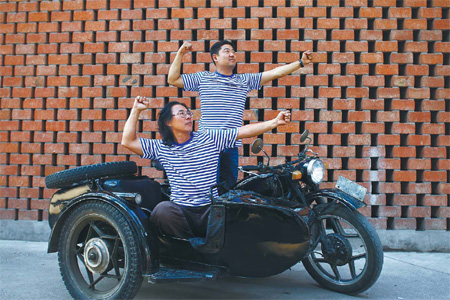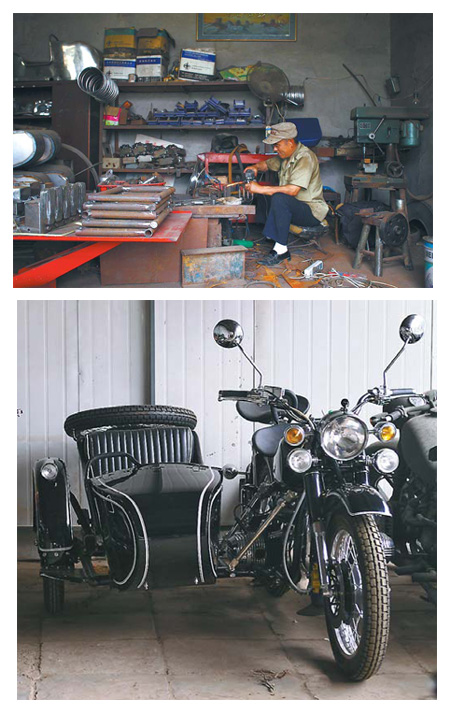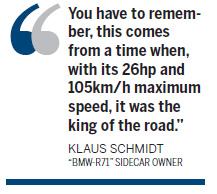Stylish sides
 |
|
It's their common passion for the unusual sidecar motorbike that brings Ren Guangli (left) and Guo Liang together as close friends. Photos by Zou Hong / China Daily |
 |
|
Top: Modifications of the color, engine, body and seats can all be done at Guo's workshop. Above: A classic BMW-R71 look-alike from Guo's collection. |

They were uniformly green, with grim-faced soldiers astride most of the time. But now, they are trendy collector's items popular with the expatriate community. Han Bingbin talks to the man who has revived the Changjiang 750 sidecars.
Ren Guangli is a loyal fan of the Changjiang 750 (CJ-750) sidecar motorbikes. He bought his first one in 1980, long before the country was inspired by war heroes in early Chinese, German and Soviet movies that showed the protagonists in furious car chases in the sidecars. The sidecars were also convenient because gasoline was cheaper then, Ren says. A usual scene in the late 1980s: men in their 30s driving proudly on the roads, their wives riding pillion and their kids in the sidecar. At the time, the police also used the CJ-750.
Up until 1997, Beijing alone had about 40 sidecar dealers, according to Guo Liang, who now heads a sidecar club in the capital. But the number has been reduced to just about four, mainly because governmental institutions such as the police department has abandoned the sidecars, and stricter emission standards and increasing road restrictions have severely curtailed their use on city roads.
But Guo said he started his business right during this period of attrition, in 2005. He now has two shops in Beijing, a show room and a workshop where he lovingly restores CJ-750 sidecars.
Guo says he is motivated by a niche marketing position. He sells sidecars only to foreigners. Before 2005, when he was working as a sales manager for a foreign company, many of his expatriate colleagues asked him to help them buy sidecars in China. That was when he realized the potential.
Guo's family used to ship many of the sidecars ordered by the People's Liberation Army (PLA) to various parts of China, so he says he has access to many of these vintage military vehicles. Through his sourcing network China-wide, Guo is able to buy genuine 1960s and 1970s CJ-750 vehicles. Some are from very old inventory that is still new or unused. Guo then gives the vehicles a complete face-lift, changing less efficient parts, and updating their appearance.
He can deliver a totally tailor-made vehicle - from engine to powder coats to even leather upholstery.
His website displays a catalogue of classic styles, based on which customers can propose their own requirements. The color, engine, body and seats and some spare parts can all be changed to a costumer's preference. Because of the relatively inexpensive price tag compared to western sidecar suppliers, Guo remains a first choice for collectors looking for the vehicles to buy.
Each can cost around 30,000 yuan ($4,654), and even in a bad year, Guo can chalk up sales of about 100 sidecars. In 2006 and 2007, he sold an average of 300 every year. More than 70 percent of his orders come directly from abroad, while expatriates in China, especially senior management in multinational companies, make up the rest of his clientele.
Klaus Schmidt, a German working in Beijing for nearly seven years, bought a sidecar from Guo's club in 2007 and has been riding it since. It has the classic BMW-R71 look: black paint with white pinstripes underlined by the 6V flathead engine and a nearly total lack of chrome.
He is happy to see that there are dealers in China who are willing to rebuild a used CJ-750 exactly to customer's specifications. In Germany, he says, one would buy the motorcycle and then modify or rebuild it yourself over time.
For Schmidt, there is no pleasure in riding his sidecar through the congested streets of Beijing. The real joy, he says, is when you can take it on the winding roads in the mountains to the west and north of Beijing "where you can fully enjoy the feeling of exhilaration this antiquated machine can give."
"You have to remember, this motorcycle comes from a time when, with its 26 hp and 105 km/h maximum speed, it was the king of the road."
The CJ-750, to Schmidt, is a living fossil in the motorcycle world. It was known to be a copy of the Soviet M-72 motorcycle created during World War II, which was an imitation of the original German-made BMW-R71 built between 1938 and 1941.
"Today, many R71 restorations in Germany use CJ-750 parts as they are often interchangeable," he says. Schmidt also wants to get things straight by making it clear that the CJ-750 is an indirect copy of the R71, a vehicle that was designed originally as a civilian vehicle using the last flathead engines built by BMW.
"It is a great feeling riding this heir of a great tradition in today's China," Schmidt says.
















